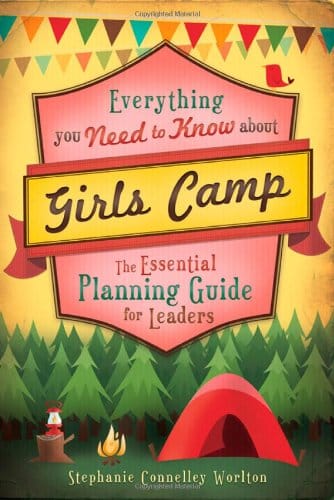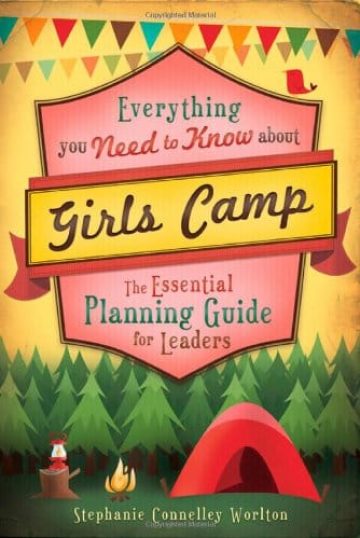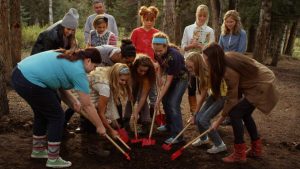Guest post by one of our Spanish translators, Lindsay.
Though I’ve been involved with the Young Women’s program through callings over the last couple of years, I haven’t been to Girls Camp since I was a young woman myself. I have distant memories of hiking, waking up in leaky tents, cooking eggs and bacon in brown paper bags, singing silly songs, and maybe some good-natured pranking (who’s to say?). These are things I think back fondly on as a sort of right of passage of being in YW.
I have a good friend, however, who has been the Stake YW Camp Food Coordinator for a few years now. Watching her plan menus, budget, and collect and prepare food for just that part of the Camp experience was eye opening for me to see just how much work goes into preparing for the entire thing. A manual with specific tips and ideas for organizing it would be invaluable. That is exactly what Stephanie Connelley Worlton’s book, Everything You Need to Know about Girls Camp: The Essential Planning Guide for Leaders is about.
Stephanie Connelly Worlton clearly loves Girls Camp. She writes about it with fondness and excitement, both for the girls that attend and for camp itself. She also shows herself to be a knowledgeable and competent Camp Director, taking into account the challenges of planning and executing camp and walking leaders through the process step by step. She discusses all the parts of camp to plan and includes a timeline and charts for planning. She also offers specific ideas for meals, example supply lists and schedules, and guidance for developing meaningful activities and crafts.
Having been involved in the Young Women’s program in my last couple of wards, it’s important to me that we not only teach our girls to develop spiritual qualities and testimonies, but also that we guide them in discovering who they are as individuals and empower them to use their gifts and talents to do good, both for themselves and in their communities. I believe that self-actualization is what will help ground the girls in their beliefs and anchor them as they make decisions for their own lives. What I appreciated in this manual was the focus on creating a Girls Camp “for girls, by girls”. Ms. Worlton emphasizes the involvement of Youth Camp Leaders (YCLs) in the camp planning and execution: “As a leader, I find it beneficial to give the YCLs ownership of “their” camp. I believe strongly in a youth-led camp and thus expect a lot from my YCLs. As young women prepare to embark on becoming adults, the leadership skills they learn as YCLs are invaluable. (p22)” YCLs can be given responsibilities from planning meals and activities to being in charge of groups of younger campers. I found this to be very empowering for all the young women—the YCLs in taking charge of camp and being leaders, and the younger girls who watch these youth leaders and see what they’ll be able to do as they get older and take on more responsibilities in camp.
Along those same lines, I believe Girls Camp is an opportune time to ask women with specific knowledge, skills and talents to come participate with and teach the young women. Ms. Worlton suggests asking priesthood leaders experienced in camping and scouting to come to camp and share their expertise, which is a great use of our resources and church community; however, inviting knowledgeable women to share their passion and knowledge could reach and motivate the girls in new and exciting ways. How inspiring would it be for the girls to listen to the stories about wildlife from a female park ranger or learn about plants from a horticulturalist? How much more meaningful could the camp certifications be with competent women teaching them the subject matter? The girls would see that the skills they are practicing are applicable to their own lives and meaningful in the lives of women they can look up to as role models.
I also think how empowering it would be for the girls to see strong women handling difficult situations. My one (feminist) critique of the book would be that where men are said to be needed to provide safety, discipline and instruction, women could just as easily perform these tasks, and if they were to do so, that might even do the girls more good to see them in these roles. In the beginning pages Ms. Worlton cites an experience where she and another leader were on a hike with a group of girls and came upon a strange man on horseback with a gun. She tells how the man was persuaded to leave when they mentioned the Priesthood holders that weren’t far away. While I do think men can be helpful in situations such as these, I also think it is both affirming and encouraging for the young women to see competent women managing problems and big choices themselves.
The book is a quick and easy read, but also entertaining and informative. It has a table of contents at the beginning for a quick reference to specific camp topics, but I would recommend reading the book from start to finish for a thorough understanding of what planning camp entails. The book makes camp seem manageable and ultimately very meaningful, despite the hard work. It WILL be worth it, for both the girls and the leaders. I recommend this book!
This is a part of the Exponent Book Review Series and Cyber Monday Giveaway. By making a thoughtful comment on this post, subscribing to the Exponent, or making a donation to Exponent II by sending a PayPal donation to [email protected], you will be entered into a drawing to win one of many books being reviewed! Check the intro post for information and terms. Entries accepted until the 5th of December 2015.








3 Responses
I was recently released after three years (this time around) serving as the Young Women president in my ward. Our stake does a stake-wide camp every other year, leaving the wards to do their own thing on the “off” years. This book sounds like it might be helpful in either situation, at least helping organizers to get their hands around what needs to be done. I’m definitely with you (and this author) on letting the YCLs take the lead; it provides such valuable experience.
Yes, I really like the idea of the YCLs taking charge because the experience of planning and executing such a big thing like Girls Camp can be really empowering. Girl power!
I’ve never been involved with planning girls camp, only going. This sounds like a great resource.